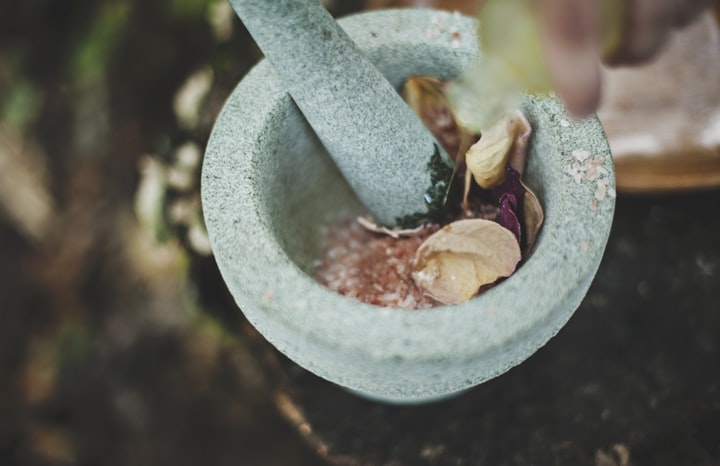Importance of Herbal Medicine
Herbal Medicine

Since the development of human culture, the use of medicinal plants has had a profound effect on magic and religion, and in each practice, there have been differing views on the concept of health and disease. While synthetic drugs act as if they have no long-term effects on the human body, medicinal plants act as a combined probiotic with few side effects in the body.
Over the past 3,000 years, a large number of plants have been used in traditional medicine in China, India, and Africa, many of which have medicinal value that can be determined by Western standards. The World Health Organization (WHO) reports that 80% of the world's population relies on traditional medicine for basic medical care, and many traditional remedies include the use of herbal remedies and their active ingredients [11] (Table 1). It is estimated that in developing lands more than four billion people, representing 80% of the world's population, rely on herbal remedies as the primary source of health care. Traditional therapies involving the use of herbs are considered culturally and socially (Mukherjee, 2002; Bodeker et al., 2005; Bandaranayake, 2006).
The increase in herbal products is due to cultural acceptance, availability, accessibility, efficiency, and safety requirements. As in other European countries, this is important, but there are many other reasons for using alternative therapies, such as the belief that they promote good health. The use of herbal remedies has been promoted in many developing lands, and alternative therapies (CAMs) have been developed in the UK, throughout Europe, North America, and Australia. of Medicine, 2005; Calapai, 2008; Braun et al., 2010; Anquez and Traxler, 2011).
Possible side effects include headaches, sleep disturbances, and digestive problems. Natural remedies are more expensive and affordable than conventional medicine, and many prefer them because they are in line with their health perceptions [1]. The growing use of herbal products has led to improved quality and analysis of these products, which has led to further clinical research on their safety and efficacy.
It is not uncommon for side effects to occur after taking herbal remedies. Therefore, herbal remedies of all kinds must be used only in consultation with your doctor. Most species are threatened with extinction, so modern scientists and naturopaths need to get as much information as possible about these species and their specific benefits, so that important details about them are not forgotten or lost.
Herbs are derived from natural sources, so people often think they are safe, but this is not always the case. Herbal products can cause unintended harm, and many supplements contain active ingredients that can have powerful effects on the body. If you are considering taking herbal supplements, it is best to consult a physician to determine the correct dosage, to understand the possible side effects, and to consider the reaction of other medications.
For example, taking a combination of herbs or using prescription drugs can lead to dangerous or life-threatening side effects. Herbs can have serious side effects when combined with medications such as aspirin, blood thinner, and blood pressure medications. In herbal medicine, active ingredients are produced from parts of plants such as leaves, roots, and flowers.
Herbal remedies, also known as herbal remedies, are herbal remedies that help to treat various ailments in the human body. Herbal remedies are known to contain active ingredients, and they are an effective means of treating illness and disease in the body. Unlike traditional medicine, herbal remedies can have serious side effects that can be harmful if not used properly.
Medicinal plants include the use of herbal remedies to treat diseases and improve overall health and well-being. Herbs are powerful and effective ingredients that should be taken with caution such as medications. Many herbal remedies are based on man-made versions of chemicals that occur naturally in plants.
Herbal remedies are based on a single active ingredient found in a plant source. Products found in herbal remedies used to treat disease or to maintain health are called herbal products, plant products, or phytomedicine. Naturopath believes that the active ingredient is less effective and safer when used alone on the whole plant.
Many prescription and over-the-counter medicines are made from herbal products and contain purified FDA-regulated ingredients. Herbal products used for indoor use are called herbal preparations. The 1994 Dietary Supplements, Health, and Education Act (DSHA) states that herbs, natural botanicals, chemicals, ingredients, metabolites, and advertisers are classified as food additives.
The 2004 European Directive / 24 / EC, adopted by the European Parliament and the Council of Europe in 2004 in Europe, contains guidelines on the use of herbal products. These guidelines state that before a herbal product can be marketed, it must be approved by the national regulatory authorities of each European country and that all pharmaceutical products must have the same level of efficacy and safety. It is important to remember that herbal preparations are not subject to FDA regulations and are not tested in medical trials approved by the FDA to prove their efficacy in the treatment or treatment of diseases.
The purpose of this study was to document how traditional healers use herbs to treat and treat human ailments and suffering in communities in Ghana. Ethnobotanical questionnaires were used to collect data from 45 clinicians and to collect samples. The results of the study revealed that herbal remedies were used in the treatment and treatment of common and specific human ailments and that such factors as time and place for harvesting plants were important in treatment.
In our study, we conducted a national online public survey in Germany to investigate the role of HM in the German health system and to answer key questions about the prevalence of HM use, user characteristics, usage patterns, and factors affecting consumption. The first significant findings relate to the level of HM availability in the German population, which is very high compared to other countries (75.4% spread over 12 months and a life expectancy of 86.7%). This finding is consistent with the general trend of growth in HM use in Germany which was observed worldwide, compared to the 12-month spread rate (26.6% obtained at Hartel and Volger in 2004 (32-70) and reported in 2010 (16).
About the Creator
Radha Karki
I am very curious ar learning new things, love to read books, paintings, art, and love singing too.





Comments
There are no comments for this story
Be the first to respond and start the conversation.